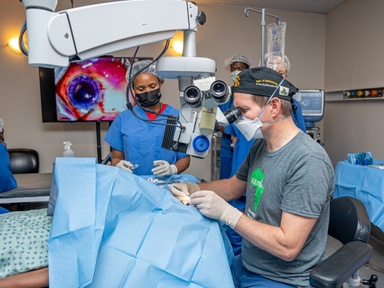
Iowa Lions Eye Bank (ILEB) provides the gift of sight to those in need of a corneal transplant—whether the recipients reside in Iowa or more than 9,000 miles away in one of the smallest countries in Africa. Through the eye bank’s long-standing relationship with Dr. Matthew S. Ward, an ophthalmologist in Provo, Utah, three donor corneas from Iowa traveled with him on a recent vision mission trip to the Kingdom of Eswatini, located east of South Africa. Their destination was the Miracle Campus of The Luke Commission; a non-governmental organization dedicated to delivering compassionate, comprehensive healthcare to the most isolated and underserved people of Eswatini. The Miracle Campus opened in March of 2020 to offer emergency and surgical health care.
Dr. Ward completed the Ophthalmology Residency Program at the University of Iowa in 2012, followed by a Cornea and External Disease Fellowship in the University of Iowa Department of Ophthalmology and Visual Sciences. During the cornea fellowship year, ILEB develops a strong connection with these future surgeons, a relationship which often endures after fellows leave the University of Iowa to begin their careers in Iowa and across the U.S. ILEB continues to work with Dr. Ward to provide quality corneal tissue for his patients in Utah and beyond. Dr. Ward is committed to international eyecare and works regularly with The Luke Commission in Eswatini to provide gratis medical and surgical services, including corneal transplants. So, when Dr. Ward began planning his January 2022 mission trip to Eswatini, he reached out to ILEB for donor corneas.
On January 20, 2022, Dr. Ward was successful in restoring sight to three young women diagnosed with keratoconus, a degenerative corneal disease affecting vision and characterized by thinning and cone-shaped protrusion of the cornea. Through the generosity of three Iowa donors and the dedicated efforts of ILEB, Dr. Ward reported, “The trip was a great success—thanks to Iowa Lions Eye Bank for their support.”
Soon after their successful corneal transplants, with the assistance of The Luke Commission staff, the recipients’ expressions of gratitude were translated into English and typed into letters for the eye bank’s family services coordinator, Deb Schuett, to share with the respective donor families in Iowa. Each young woman told of her long and difficult journey to receiving the rare miracle of restored sight in a country where corneal blindness is widespread and few are able to receive such an amazing gift.
Lethokuhle, age 17, wrote, “I struggled with my eyesight ever since I was born. When I went to school, I squinted to see, and failed Grade 2 because I had double vision when looking at letters and objects. After the transplant surgery, I felt relieved and all the hope I had lost was restored. I am so motivated and passionate about finishing school and want to study to be an ophthalmologist because of the experience where I almost lost my sight. I want to help other people here who are like me.”
In her lengthy letter, 18-year-old Goodness talks about her struggles with poor eyesight since the age of two and being told that losing her vision was due to allergies. “My eyesight problem impacted my life. It was difficult helping my mom with chores at home and my biggest challenge was at school. I had a dream of becoming a teacher and that dream was vanishing as I was slowly losing my eyesight.” She concluded her letter by saying, “Now that I have received the cornea transplant, I feel like I have been given a second chance in life. I would like to thank the donor for this gift that I will always remember.”
Phindile’s mother died when she was only 12 years old. She is now 23 and shares, “I live with my grandmother and my four siblings. I finished my high school with a dream of going to medical school to study nursing. Unfortunately, I had to give up on that dream as I struggled with my eyesight. I have been staying home for the past eight years. I stopped going to school because I could no longer see. I would cry myself to sleep because I thought I would become totally blind. I pretended as if could see when people showed me things, as I didn’t want them to pity me. I felt hopeless.” In closing her letter, she wrote, “To the donor, I want to say thank you for saving my vision and restoring my dream of going back to school. I am looking forward to the future and above all, so thankful for the gift of restored sight.”
